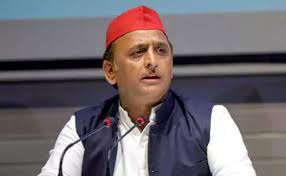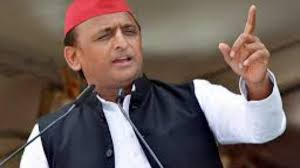Akhilesh Yadav’s


Amid the ongoing turmoil in Bangladesh, Samajwadi Party leader Akhilesh Yadav has stepped into the fray with a pointed critique of India’s foreign policy approach towards its neighbor. Yadav’s remarks, which offer a blend of caution and advice, underscore the growing concerns about the political and social instability in Bangladesh and its potential implications for India. His comments also reflect a broader debate on how India should navigate its relationship with Bangladesh during a period of uncertainty.
Table of Contents
The Situation in Bangladesh
Bangladesh, a nation with deep historical and cultural ties to India, is currently facing significant internal challenges. Political unrest, economic difficulties, and social tensions have combined to create a volatile environment. The country has seen widespread protests, allegations of government corruption, and accusations of human rights violations. The ruling Awami League, led by Prime Minister Sheikh Hasina, has been accused by opposition groups of stifling dissent and manipulating the electoral process.
These developments have drawn international attention, with concerns about the stability of Bangladesh’s democratic institutions and the potential for escalating violence. For India, which shares a long border with Bangladesh and has a vested interest in the stability of its eastern neighbor, these issues are of particular concern. The situation is further complicated by the influx of refugees and the impact on cross-border trade and security.
Akhilesh Yadav’s Critique
Akhilesh Yadav, former Chief Minister of Uttar Pradesh and leader of the Samajwadi Party, has taken a critical stance on the Indian government’s handling of its relationship with Bangladesh during this tumultuous period. In his recent remarks, Yadav has called for a more nuanced and sensitive approach, arguing that India’s current foreign policy lacks the necessary foresight and empathy to effectively manage the complexities of the situation.
Yadav’s critique centers on the idea that India’s foreign policy towards Bangladesh should prioritize dialogue and diplomatic engagement over coercive tactics or overt displays of influence. He has emphasized the importance of respecting Bangladesh’s sovereignty and avoiding actions that could be perceived as interference in its internal affairs. Yadav’s comments suggest that a more collaborative approach, one that acknowledges the concerns of the Bangladeshi people and government, would be more effective in maintaining stability and fostering goodwill.
The Need for a Balanced Approach
One of the key points raised by Akhilesh Yadav is the need for a balanced approach that considers both India’s strategic interests and the socio-political dynamics within Bangladesh. Yadav has warned against the dangers of adopting a one-dimensional policy that focuses solely on security concerns or economic interests at the expense of broader diplomatic relations.
He has highlighted the risks associated with a heavy-handed approach, particularly in a region where public perception and nationalist sentiments play a significant role in shaping political outcomes. Yadav argues that India’s foreign policy should be guided by principles of mutual respect and cooperation, with an emphasis on building trust and understanding between the two nations.
Lessons from the Past
In his critique, Yadav has drawn on historical examples to illustrate the potential pitfalls of an overly aggressive foreign policy. He has pointed to past instances where India’s relationships with neighboring countries have been strained due to perceived interference or a lack of sensitivity to local contexts.
For instance, Yadav has referenced the 1971 Bangladesh Liberation War, where India played a crucial role in supporting Bangladesh’s independence from Pakistan. While India’s involvement was instrumental in the creation of Bangladesh, the relationship between the two countries has seen ups and downs in the decades since. Yadav suggests that lessons from this history should inform India’s current approach, particularly in terms of maintaining a careful balance between support and non-interference.
The Role of Diplomacy
A central theme in Akhilesh Yadav’s advice to the Indian government is the importance of diplomacy. He has argued that diplomatic channels should be the primary means of addressing the challenges posed by the current situation in Bangladesh. Yadav believes that India’s diplomatic efforts should focus on fostering dialogue between the Bangladeshi government and opposition groups, encouraging peaceful resolution of conflicts, and supporting democratic processes.
Yadav has also suggested that India could play a more active role in regional organizations and forums that include Bangladesh, such as the South Asian Association for Regional Cooperation (SAARC). By engaging with Bangladesh through these multilateral platforms, India can help to promote regional stability and cooperation, while also addressing specific concerns related to Bangladesh’s internal situation.
Implications for India-Bangladesh Relations
Akhilesh Yadav’s critique of India’s foreign policy towards Bangladesh comes at a time when the relationship between the two countries is at a critical juncture. The current turmoil in Bangladesh has the potential to impact various aspects of India-Bangladesh relations, including trade, security, and people-to-people ties.
Yadav’s call for a more thoughtful and empathetic approach reflects concerns that mishandling the situation could lead to long-term damage to the bilateral relationship. He has warned that alienating Bangladesh or its people could have serious repercussions, including the possibility of increased anti-India sentiment and the erosion of the goodwill that has been built up over the years.
The Way Forward
In conclusion, Akhilesh Yadav’s “foreign policy” advice to the Indian government highlights the need for a more nuanced and diplomatic approach to managing the challenges posed by the current situation in Bangladesh. His remarks underscore the importance of balancing India’s strategic interests with a genuine commitment to supporting Bangladesh’s stability and development.
Yadav’s critique serves as a reminder that foreign policy is not just about pursuing national interests, but also about building relationships and understanding the perspectives of others. As India navigates its relationship with Bangladesh during this period of turmoil, Yadav’s advice could serve as a valuable guide for ensuring that India’s actions are both principled and pragmatic.







